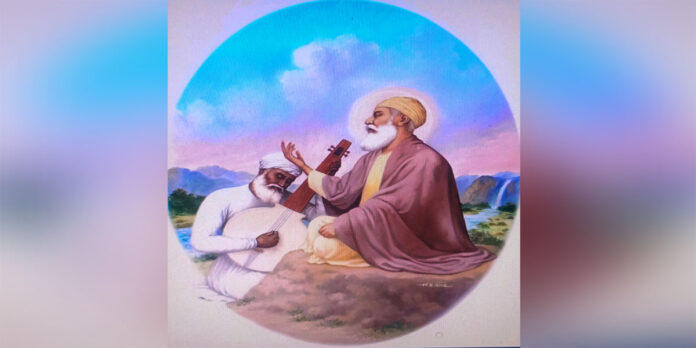The teachings of Guru Nanak Dev Ji, the founder of Sikhism and his Philosophy of Universalism seem to be more relevant in contemporary times when the humanity is passing through all shades of serious crises and conflicts. His 550th birth anniversary proved to be a watershed in the history of Indo-Pakistan relations in an era of bitterness, animosity and unprecedented provocations on both sides.
The decision of opening of Kartarpur Corridor and visa-free access to the followers of Baba Nanak’s philosophy to the religious shrine at Kartapur in Narowal district of Pakistan, which is just less than four kilometer from Dera Baba Nanak, another revered place of the Sikhs in the Indian Punjab near the international border, is the testimony of Baba Nanak’s teaching of love, brotherhood, universalism etc. With this decision, the seventy two year old cherished dream of the Sikhs of India stands fulfilled in spite of serious reservations from various quarters both in India and Pakistan. The reciting of prayer by the Sikhs two-time a day which invokes the Sikh community’s uninterrupted access to religious places left behind Pakistan as a result of the division of the subcontinent in 1947.
This development will not only open a new era of mutual trust and cooperation between the two warring countries but will also lay a strong foundation of people-to-people dialogue. Baba Nanak himself always practiced dialogue to remove ignorance, sectarian practices, irrational divisions in the social structure to liberate mankind from parochial thinking and biased approach to establish an egalitarian society based on justice and free from darkness of blind ritualism and orthodox practices. Through His teachings and practices He sought to morally rejuvenate and regenerate the then social system that was, according to him, at its lowest level.
The teachings of Guru Nanak Dev Ji show us the path of establishing a just social order of his times which was based on inequality and injustice. He not only condemned but challenged that social order. He was a strong critic of exploiters of the marginal sections of the society and was fully aware of the structure of exploitation in that social order was coming in the way of establishing an egalitarian society. In this way, the Guru’s ideology was deadly against the unjust order of the then Mughal ruler Babur. He condemned the caste structure and showed a path to his followers to rise above the distinctions of caste. He himself practiced a life in which he made Bhai Mardana and Bhai Bala from the lower castes, his closest disciples.
Upholding the dignity of woman has a special place in His teachings. He not only talked about the equality of men and women but gives special space to the woman as a creator. The women were considered very low in social hierarchy of the prevailing patriarchal society. They faced discrimination and humiliation at various levels. The dignity of women has been underlined in the verses of Guru Nanak: From woman, man is born; Within woman, man is conceived; to women he is engaged and married. Woman becomes his friend; Through woman, the future generations come. When his woman dies, he seeks another woman; to woman he is bound. So why call her bad? From her, kings are born. From woman, woman is born; without woman, there would be no one at all.– (Guru Nanak, Raag Aasaa Mehal 1, Page 473).
The uniqueness of his deep philosophical insights gave birth to the concept of ‘Secularism’. He was among the first who paid homage to the ideal of Na ko Hindu, na Musalman (there is no Hindu, there is no Musalman) and all are the creation of the Almighty. His conviction is that the entire universe is suffused with divine light thus putting forth a positive prospect of humanity. Leading an exemplary life, Guru Nanak presented a new vision of life to end the dissension among the people. His ideology was so simple, so compassionate and so practical that the disenchanted people found in him a Messiah who gave a new purpose to their lives.
The philosophy of Baba Nanak, from the very beginning devised an inbuilt system for the co-operative provision of free food (langar), accommodation, and security for the needy. Before leaving the mortal world at Kartarpur (Pakistan), the Guru selected his successor from amongst his followers and by the time He left the human body, the nucleus of a new social group had come into existence with an acknowledged Guru to guide and sustain its social and religious life. He built a community at his last place as a model of an egalitarian and sustainable society based on three principles i.e. sangat, pangat and langar (congregation, sitting in row and free kitchen).This was to give practical shape to his teaching of oneness of mankind, to eliminate social distinctions and to promote community ownership and voluntary pooling of the resources.
Lending dignity to labour was another important contribution of His philosophy. He preached: “they alone who live by the fruits of their own labour and share its fruits with others have found the right faith”. It caused a deadly blow to the prevailing caste structure, social hierarchy and untouchability. This ideology laid emphasis on self-reliance achieved through hard work which would be the source of the identity and self-respect of those practising it. Primacy was given to build an equitable society where the deprived, the oppressed and the women could experience a new meaning to their existence.
It is in this context, the teachings of Guru Nanak have a great relevance in the contemporary times. His vision of environment i.e. Pawan Guru, Pani Pita, Mata Dharat Mahhat (Air is our guru,Water our father and land our mother) about five hundred years ago is a testimony to his vision of human existence and its challenges in times to come. He left His legacy to the whole mankind.
About author: Jagrup Singh Sekhon is a former Professor of Political Science, Guru Nanak Dev University, Amritsar (Punjab), India.





